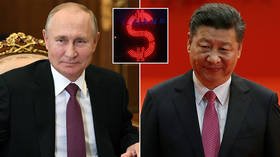Ukraine SWIFT threat likely a bluff but US weaponization of financial system only encourages Russia & China to dump dollar faster

American sanctions and threats to exclude countries from payment systems like SWIFT are hastening the superpowers’ decline and reducing the leverage of the dollar. Recent comments from Kiev have only served to highlight this.
Leonid Kravchuk, the first president of Ukraine (1991-94) and the current head of the Ukrainian delegation to the Trilateral Contact Group set up to end the war in Donbass, has threatened Russia with exclusion from the SWIFT international payment network unless there was progress on a resolution of the conflict. These are strong words, which may or may not be a bluff.
This article avoids a discussion of the blame for failing to implement the Minsk Agreement for peace in Ukraine, its focus is devoted rather to the peculiar threat by Kravchuk. It is a strange, as, in the first instance, Ukraine does not have any influence over SWIFT. Although, if it is supported by the US it would represent a dramatic escalation.
Weaponizing SWIFT
The Society for Worldwide Interbank Financial Telecommunication (SWIFT) provides banks with a secure messenger network to allow international transfers. This is the dominant transaction system in the world and expulsion from the club would wreak havoc on Russian banks and the financial sector.
Also on rt.com Former Ukrainian politician arrested in Moscow while allegedly trying to sell smuggled Iron Age gold for $2.3mnSWIFT prides itself of taking a neutral position in politics, and its headquarters are in Brussels, which constrains the ability of the US to cut off other countries. Yet, precedents exist: Iran and North Korea were cut off the SWIFT network as part of US-led sanctions to cripple their financial systems.
Also, SWIFT is an important instrument of US economic coercion by extracting data from the system.
As global trade is cleared through US-based computers and usually denominated in US dollars, Washington uses the information from SWIFT to impose extra-territorial jurisdiction, so the world must abide by US unilateral sanctions.
As US Treasury Secretary Steven Mnuchin informed G7 finance ministers last year: “If you want to participate in the dollar system you abide by US sanctions.”
In 2014, the US fined French banking group BNP Paribas nearly $9 billion for violating US embargoes against Sudan, Cuba and Iran. Similar methods were used against Alstom, the French energy and transportation conglomerate, which the US accused of bribing officials in Indonesia. The US Department of Justice ended the investigation into Alstom in 2014 when it was agreed that General Electric, its main US rival, would procure the French national champion.
Decoupling Russia from SWIFT?
The US has periodically threatened to cut off Russia from SWIFT since the Ukraine crisis in 2014. In March 2014, Washington cut off Crimea from Visa and MasterCard as a response to the referendum on the peninsula.
SWIFT sought to restore trust in the network by announcing it will not cut Russia off the SWIFT system, even if the Americans insisted.
Yet, the continuous threat to crash the Russian financial system, cripple the economy and throw millions of families into poverty was taken seriously. In 2015, then Prime Minister Dmitry Medvedev warned that Russia would retaliate against expulsion from SWIFT: “Our economic reaction and generally any other reaction will be without limits”.
Also on rt.com Paper publishes alleged emails, files of Biden’s son Hunter, claiming he peddled influence in UkraineThe end of the SWIFT monopoly
Trust in SWIFT has evaporated around the world. Russia has responded to the US weaponization of SWIFT by creating an alternative – the Financial Messaging System of the Bank of Russia (SPFS). Russia has also launched a national card payment system due to the unreliability of Visa and MasterCard.
The threats from the US have incentivized a strategic financial partnership between Russia and China. Recognizing it could be next in Washington’s crosshairs, China developed CIPS in 2015 alternative to SWIFT.
This will be connected with Russia’s SPFS, and both countries are linking up their respective systems with third countries. Chinese and Russian credit cards also collaborate and foreign financial institutions issue co-branded cards.
Russia’s departure from total reliance on SWIFT complements a wider effort to decouple from the US-led financial system. Moscow and Beijing are leading a larger international effort towards de-dollarization. The use of the greenback is reduced in transactions and in their foreign reserves. With new development banks, even rating systems, a new international financial architecture emerges to construct a post-Bretton Woods world.
Even the EU has grown weary of the US abusing its dominant role in international finance. After unilaterally pulling out of the Iran nuclear agreement (JCPOA), Washington threatened to sanction European states that still abide by that international agreement. The Americans also levy sanctions against German companies participating in the Nord Steam II pipeline, with the ludicrous stated aim of protecting Germany from Russian influence. Subsequently, the EU launched the Instrument in Support of Trade Exchanges (INSTEX), its own alternative to SWIFT, as a back-up.
Also on rt.com Ukrainian opposition threatens possible impeachment of President Zelensky as constitutional crisis in Kiev deepensThe limits of economic coercion
The dominant position of the US in the international economic system has rested on trust – that Washington will not abuse its role as the administrator of the world economy to target competing states. As the US continues its relative decline, its proclivity for economic coercion increases and it must open more fronts.
The Chinese-Russian partnership to develop a new system for financial connectivity is the first of three pillars for a new geo-economic architecture. The second pillar is new physical connectivity with transportation corridors by land and sea, including the Arctic. The third pillar is a tech-partnership as Russia and China decouple from US digital platforms that lay the foundation of strategic industries expected to lead in the fourth industrial revolution.
In 2015, Washington cautioned its allies not to join the Chinese-led Asian Infrastructure Investment Bank (AIIB), set up as a rival to the US-led IMF, World Bank and Asian Development Bank. Former US Secretary of State Madeleine Albright recognized the effort backfired, as “all of a sudden everybody was in”, which instead isolated the US. The effort to separate states from SWIFT is similarly creating an international financial architecture that isolates the US.
Economic coercion functions optimally in moderation, while in its excesses the world learns to live without the belligerent power. The threats of Kravchuck, whether supported by the US or not, will ultimately matter less and less to Russia.
Think your friends would be interested? Share this story!
The statements, views and opinions expressed in this column are solely those of the author and do not necessarily represent those of RT.
The statements, views and opinions expressed in this column are solely those of the author and do not necessarily represent those of RT.













